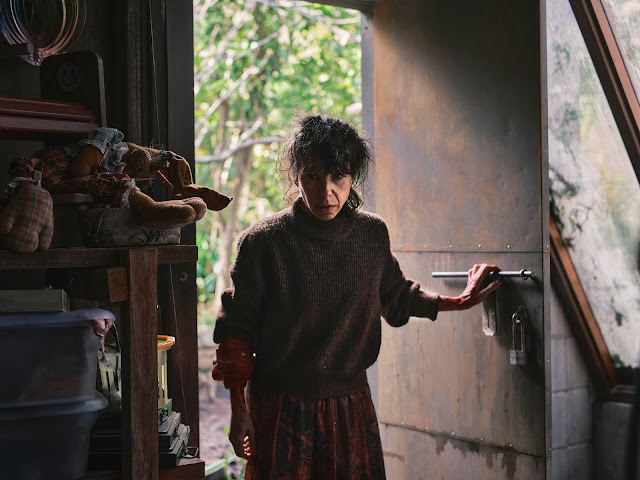Bring Her Back: Grief At Its Most Unsettling.
Consider this a friendly warning: you need to be fully prepared before diving into a film like this.
Bring Her Back is gnarly, chilling, and heartbreakingly raw. A brutal exploration of grief and trauma that left me genuinely shaken (I almost threw up while watching). I can’t stop thinking about it—it’s easily one of the most unsettling films I’ve seen in a long time. I’m low-key traumatized, and I honestly can’t remember the last time a screening affected me like this.. The film dives headfirst into harrowing themes: child abuse, the unbearable weight of grief, and—most disturbingly—the refusal to accept loss. All of this unfolds through violence so intense, I’ve rarely seen anything like it on the big screen. It left me wondering: how does one (or two) even begin to write a film like that?
Bring Her Back opens with a VHS tape of a satanic ritual. If you don’t know the premise going in, you might wonder what is going on, as it quickly shifts to Piper (Sora Wong) and Andy (Billy Barratt) casually getting out of school. Still, that creepy opening quickly sets the tone for a film that only gets more twisted as it goes.
In the first couple of minutes, siblings Piper and Andy are placed into foster care after their father’s death (an event they witness and that definitely leaves deep emotional scars). They’re sent to live with Laura (Sally Hawkins), who, at first glance, seems like a kind, slightly awkward woman. There's something sweet but odd about her, though not in an alarming way… yet. From the beginning, though, it's clear she’s not exactly excited about taking care of Andy. She repeatedly calls him by the wrong name when he arrives and even takes a selfie with the kids, where she conveniently hides him behind her head. No retake offered. No interest in hiding the favoritism. It’s clear from the get-go: she only wants Piper to be there (she said she didn’t want to foster him, so that’s not surprising). She also has a boy under her care, Oli (Jonah Wren Phillips), whose presence gives you chills from the very beginning. His blank stare and lack of speech hint at something, and Laura reveals that she had a daughter (also blind like Piper) who died some time ago, leaving lasting damage on Oli.
Wren Phillips delivers an impeccable performance as Oli—his presence is one of the most unsettling in the film. The way he moves, the way he simply exists—he got under my skin right away.
Laura’s behavior quickly begins to veer from quirky to increasingly disturbing throughout the film as she starts telling odd little lies to Piper, always teetering on the line between playfulness and manipulation (until it gets out of hand). And those offbeat moments begin to stack up, and slowly, the film reveals that Laura’s oddities aren’t so innocent…
The VHS tapes from the beginning? They come back. And Laura’s obsession with them, along with the way she treats Oli and all the little things she says and does, begins to paint a much darker picture. Her role as a foster mom starts to be disturbing (and even horrifying) in every way. One particular sequence sent a chill down my entire body (though, to be honest, most of them did). I won’t go into details, but it’s one of the most disturbing scenes I’ve seen in recent years—I still feel it in my gums (and if you’ve seen the film, you know exactly what I mean). The sound design and editing are impeccable throughout the film, but they reach a terrifying peak in that moment, and it doesn’t let up until the very end. Every creak, every noise—I can still hear them.


Comments
Post a Comment